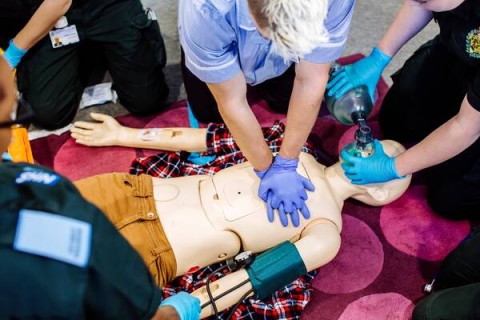

The £2m investment will enhance the learning of over 2,000 healthcare students.
16 December 2021
5 min read
The Office for Students has awarded the University of Portsmouth £2m to expand its facilities to help address the shortage of health and social care professionals locally and nationally.
The funding will see the development of an inter-professional learning hub for healthcare students, with state-of-the-art simulation, audio-visual technology and virtual reality equipment designed to educate and train future health professionals.
The investment will enhance the learning of over 2,000 healthcare students to ensure they have the skills, knowledge and confidence to meet the changing demands of the 21st century healthcare workforce.
The University already has excellent healthcare simulation facilities including simulated wards, an operating theatre, a simulated pharmacy and facilities focused on health and social care. These allow students to learn both basic competencies and more complex management scenarios in a safe environment.
This significant investment in new innovative collaborative learning equipment and facilities will enable even more students to benefit from this sophisticated technology, to become the highly skilled and confident healthcare professionals that the region and the UK critically needs.
Professor Graham Galbraith, Vice-Chancellor
The funding will help to significantly expand and enhance these facilities through investment in expert systems including:
• Additional Anatomage tables – an Anatomage table is a life-sized virtual cadaver (imagine a human-sized iPad) representing a whole range of human disease, trauma and illness. This allows for anatomical diagnosis, physiological reaction to treatments and virtual dissection.
• A suite of high-fidelity manikins representing humans of varying age, size, ethnicity and health conditions. These will develop students' knowledge and skills in a variety of scenarios such as deteriorating condition and ventilation due to COVID-19, a drowning incident and management of complex birth and postnatal care.
• Developing enhanced simulation facilities to create an authentic and broad range of exercises, potentially including simulating major events (flood, terrorist attacks), allowing students to gain invaluable experience of interacting and training with qualified practitioners across a range of external areas including healthcare, emergency services and armed forces personnel.
• Specialist software and hardware to enable filming and observation of simulated learning activities to provide immediate feedback to students, making learning more effective.
• Interactive online classrooms to support innovative teaching and co-creation by students.
The funding will also support growth in student recruitment to healthcare courses by 15 per cent over a three-year period and develop new approaches to inter-professional learning across courses to meet regional and national skills needs.
Professor Graham Galbraith, Vice-Chancellor of the University of Portsmouth, said: “We have a well-established reputation for providing a wide range of inter-professional healthcare programmes, which have strong community links, partnership working with healthcare trusts and relevant accreditation and additional endorsements from professional bodies.
“It is clear, certainly from the significant challenges posed by COVID-19, the planned recovery of health and social care as well as the crisis in social care, that we must provide our students the very best teaching, equipment and facilities. The country and the region will benefit from the increased knowledge, skills and confidence of Portsmouth graduates for patient safety, experience and outcomes.
“This significant investment in new innovative collaborative learning equipment and facilities will enable even more students to benefit from this sophisticated technology, to become the highly skilled and confident healthcare professionals that the region and the UK critically needs.”
The Rt Hon Penny Mordaunt, Portsmouth North MP and Minister of State for Trade Policy, said: “This is very welcome. We know that healthcare professionals (HCPs) often stay in the area they train in. This is also a vote of confidence in the training offer at the University of Portsmouth. As a nation we need to massively increase HCPs and I’m glad to see this investment.”
Portsmouth South MP Stephen Morgan said: “This funding provides a significant boost to the University’s state-of-the-art health and care learning offer at a critical time for our City’s services.
“Given the ongoing challenges posed by the pandemic and acute staffing shortages in the social care sector, I will continue to support the University in its bid to train the next generation of staff to serve in our community.”
Gosport MP Caroline Dinenage said: “Our healthcare workforce is the beating heart of the NHS so it is fantastic to hear that the University of Portsmouth has received this additional funding to enable them to train more health and social care professionals.”
The successful bid reflects the University’s strategic relationships with key regional partners, including Portsmouth Hospitals University NHS Trust and Portsmouth City Council.
The University will work with NHS employers in the region to address their skills needs through additional placements, education and employment opportunities.
Professor Sherria Hoskins, Executive Dean of the Faculty of Science and Health, said: “This investment addresses significant regional and national skills shortages. NHS partners in parts of our region, including the Isle of Wight, face particular skills shortages along with health deprivation and reduced life expectancy. Consequently, this capacity expansion is essential to actively support the Solent Local Enterprise Partnership (LEP) and employers to close the regional skills gap, while supporting the City Council to achieve ambitions in its health and wellbeing strategy.”
Given the ongoing challenges posed by the pandemic and acute staffing shortages in the social care sector, I will continue to support the University in its bid to train the next generation of staff to serve in our community.
Stephen Morgan, Portsmouth South MP
The funding will also enable the University to continue to meet its commitment to widening participation and meet its strategic civic aims.
Professor Hoskins added: “Our success in widening participation in healthcare education to under-represented groups, including black and minority ethnic students, is important for future healthcare given the need to reduce health inequalities for all communities.”
